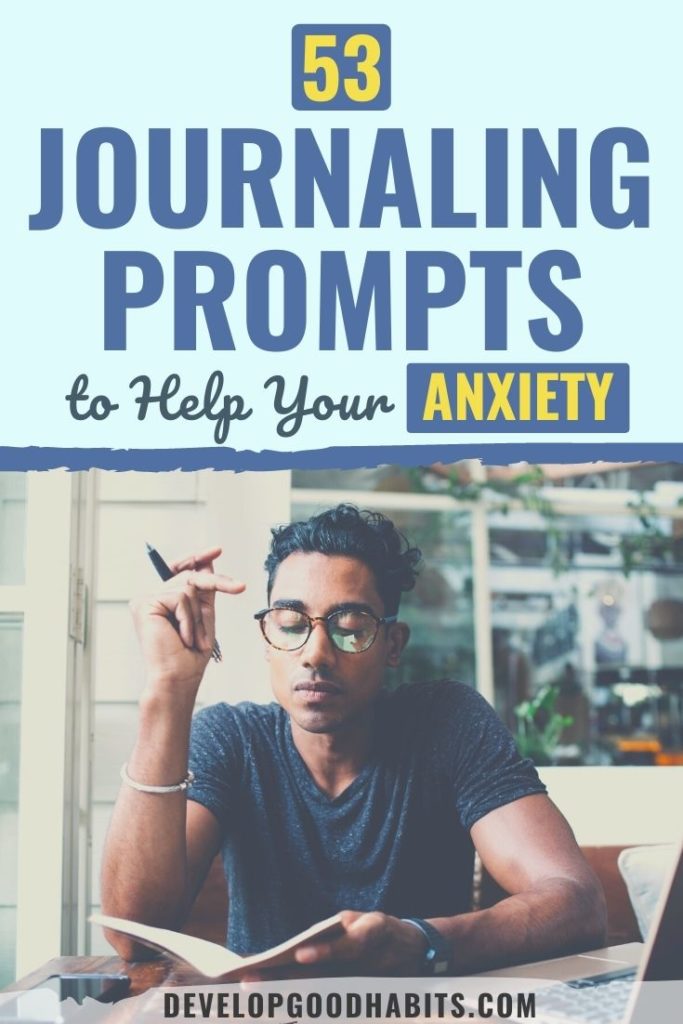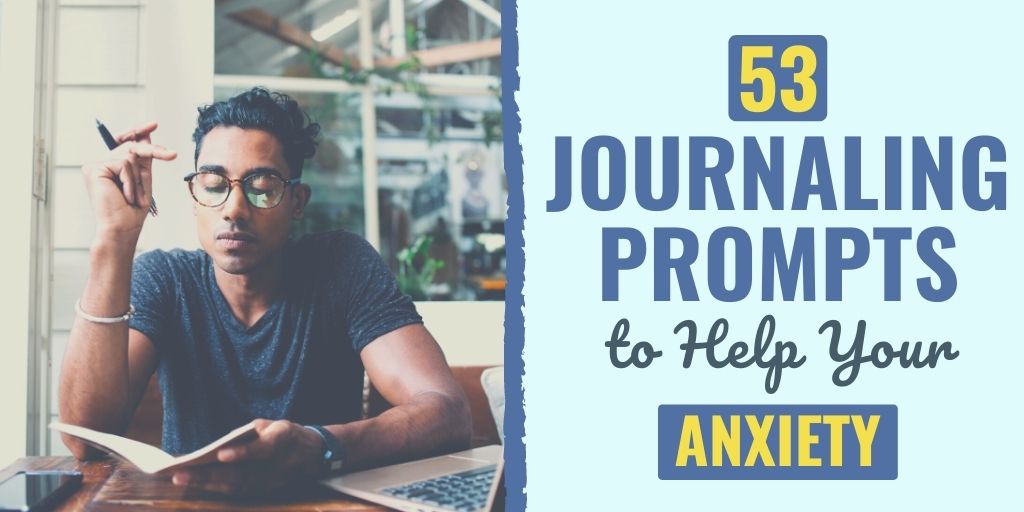There might be affiliate links on this page, which means we get a small commission of anything you buy. As an Amazon Associate we earn from qualifying purchases. Please do your own research before making any online purchase.
If you feel as though anxiety is controlling you, then you might want to try journaling for anxiety. In fact, anxiety is something I deal with every day and I'm committed to coping with it. Despite the difficulty in facing my fears, I manage to control my anxious thoughts quite well.
Journaling can be very effective in reducing anxiety and stress. It also strengthens your memory, helps you keep better track of goals and makes it easier to achieve them. You’ll also find it can boost self-confidence and give you a way to track growth and progress, among other things.
Some of the most common types of journals include gratitude journals, art journals, travel journals, dream journals, fitness journals, productivity journals, and food journals. While keeping a gratitude journal can give you a way to reflect on what you're grateful for on a daily basis, art journaling allows you to practice self-care and express yourself creatively through writing and/or art.
I regularly keep one journal for gratitude and another for art. I notice that doing this motivates me to be a better person, allows me to have a positive outlet, and gives me a peaceful way to be healthier and happier. In this post, I'll be sharing journaling prompts you can use to ease your anxiety.
What is Anxiety?
Anxiety makes a person feel unease, dread, and fear. This can cause you to feel tense and restless, have a rapid heartbeat, and sweat. Moreover, it's important to try and identify the source of it. Doing so can be helpful in managing it effectively, having extra peace of mind, and improving your quality of life. This means you'll be in a better place to be happier and more successful in your career and relationships.
The effects of anxiety on a person's mental and physical well-being can be serious and even life-threatening. For one thing, untreated anxiety may lead to physical ramifications such as chronic pain, heart disease, obesity, and digestive disorders. Besides this, other conditions anxiety is associated with are respiratory illnesses, sleep disorders, thyroid problems, and substance abuse disorders.
You may also experience social isolation, dementia, depression, and more. I've had anxiety for years and this can make it harder for me to breathe. This makes getting a full night's sleep a challenge that affects my daily health and well-being.
How Can Journaling Help With Anxiety?
Journaling can help with anxiety by calming and clearing the mind. You'll be able to let go of negative thoughts, escape stressors that affect you every day, and release pent-up feelings. In addition, journaling for anxiety can be helpful in identifying the cause of your anxiety, so you can manage it better.
Journal Prompts for Anxiety
Journal prompts are useful ideas that help you stay focused on one topic to write about. By using journal prompts, you won't have to waste time coming up with a topic on your own. Instead, you can focus on dealing with your anxiety in a healthy way. I do journaling for anxiety often and actually enjoy writing. I hope you can also take pleasure in the prompts I came up with here:
- Keep a list of your first thoughts each morning. In what ways could these thoughts affect your mood throughout the day?
- For times when your anxiety reaches its peak point, make a list of 10 positive affirmations you can repeat.
- What activities help calm you down?
- When you feel overwhelmed, what self-care ideas can be helpful?
- Write down three things to look forward to on a daily basis.
- What's one song that makes you happy? Describe why you love it.
- What are your anxiety triggers? Make a list.
- Record how much time you spend using technology and how doing this affects you. Then think up ways to reduce your technology use.
- Reflect on a moment that made you smile today.
- Jot down three qualities you like about yourself.
- How do you know an anxiety attack is about to happen?
- Describe in words what your perfect day looks like.
- To be more positive, write down six things you're grateful for today.
- What worries would you like to let go of?
- Create a list of coping strategies you've used before for your anxiety. Then rank these from one to 10, with 10 being the most effective.
- What about your bedtime routine could make getting enough rest a challenge?

- Which situations make you the most anxious?
- Write about what made you anxious today.
- What are the three most important lessons you've learned from having anxiety? How have these improved your life?
- Put down three inspirational quotes you enjoy reading.
- Write a poem about what you love about yourself.
- If your life was completely free from anxiety, what would you be doing?
- Write a letter of thanks to someone who's always there when you're in need. Consider giving it to him or her or keeping it for yourself.
- Jot down three things that bring you peace and why.
- Create a list of three short-term and three long-term goals you'd like to achieve so you can stress less about the future.
- What have you learned from something you've failed at in the past?
- What's one country you'd like to visit? Name a few reasons why.
- Write down three ways you can stay active today. Staying active can be helpful in lowering symptoms of anxiety.
- Think about a person whose hurt you and write down how you can forgive him/her.
- Write down three positive affirmations you can repeat in the morning. Doing this at the start of your day can boost your positivity for the entire day.
- Name two to five accomplishments or strengths you're proud of.
- Which person inspires you the most in the world and why does he/she make you feel this way?
- In what places do you feel safest and why?
- Spend a few minutes focusing on the feelings in your body when you're anxious. How does your anxiety feel and which body parts does it affect? Try doing this regularly to gain awareness of how anxiety builds up within you so you can manage it more effectively.
- When was a time you went out of your way for someone and when did someone do something good for you?
- Create a list of some of your values and why these matter to you.
- What are five things you wish you did more often? And what holds you back from doing these things?
- Name one way you could improve your morning routine and one way you could improve your nighttime routine.
- What would you call your anxiety if it were a movie or book? For instance, you might call it, “A Story of Fear” or “I Need Help Now”.
- How can being kinder to yourself when you have anxious thoughts help you cope better?
- In what ways is being caught up in a time that bothers you holding you back from living the life you really want?
- What emotion do you enjoy feeling when you feel secure and safe? How can you feel this emotion more often?
- What happened when you last had anxiety?
- What are you most fearful of and what evidence supports this fear? Now explore what disproves this fear.
- Consider what makes you anxious. Do you have anxiety because you're ignoring your true feelings? The key to managing anxiety can be listening to yourself in a deeper way.

- What did you do the last time you felt anxious and was it helpful?
- Do you live in the past, present, or future most? How can committing to living in the moment boost your positivity?
- At moments when you're feeling anxious, writing one phrase repeatedly in a journal can be calming. For example, you may want to write, “I am calm.”, “I am safe.”, or “I love myself.”
- What would your ideal outcome be in your situation? If everything went right, how would you feel?
- Instead of feeling like your anxiety controls you, what would your life be like if you controlled it?
- Consider whether you have a positive or negative relationship with your finances. Do you feel as though it makes your anxiety better or worse?
- Write down five things in your living space you can improve to help you feel calmer and safer each day.
- Think about what your worst habit is. How could changing it improve your life?
Final Thoughts on Journaling for Anxiety
Journaling for anxiety has a variety of benefits that can help you live a healthier lifestyle. Rather than take up your valuable time worrying, you'll be better able to cherish your experiences and relationships. Journaling is a great from of self-care, and something you should take advantage of daily because you deserve it.
I know this can be a challenge, but committing to being healthier and happier is entirely worth the effort. It's important to know that taking care of yourself isn't selfish in any way… and should hold as much weight as feeding the kids a nutritious meal, or meeting that work deadline. If you’re not feeling good about yourself, it can cause a domino effect that ruins many other aspects of your life.
And if you haven't found the right journal prompts for anxiety here, you can try brainstorming your own. Or consider asking a friend to join you in coming up with some. We know you have what it takes to take charge of your life… all you have to do is face your fears and commit to journaling for anxiety.
The benefits you gain from this can be life-changing. And if this article resonated with you, we have another one you might want to read about ways to naturally stop an anxiety attack.
Finally, if you don’t know the “right” way to journal, then check out this seven-step process for building a journaling habit that sticks.


